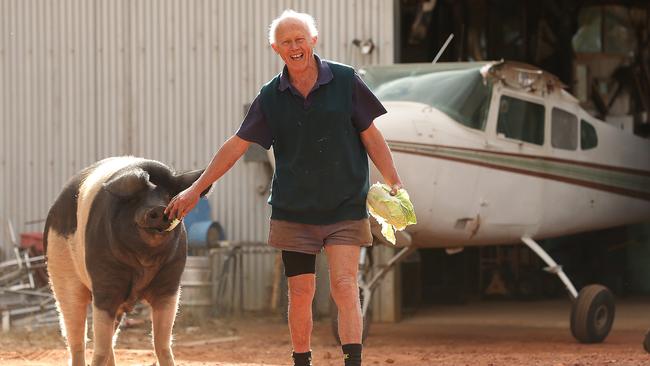Coronavirus: Tech filling the care gaps in time of crisis
Chest pain while on a bike ride was the first sign that Allen Parsons had suffered a second heart attack.

Chest pain while on a bike ride was the first sign that Allen Parsons had suffered a second heart attack.
After surgery in early March to insert stents into his arteries, the automotive inspectorbegan participating in a telehealth heart rehabilitation program.
Medibank’s Heart Health at Home program has recorded an almost 40 per cent surge in patient referrals during coronavirus, with hospitals suspending their face-to-face cardiac rehab programs because of the pandemic.
The program is the first completely remote heart rehabilitation program in Australia.
Like many rural Australians, Mr Parsons, 71, whose closest hospital is almost 50km away in Toowoomba, has found telehealth crucial to recovery in the absence of a local services.
“It’s done remotely so I can do it anywhere. I can do it at home and I’ve done it when I’ve been at work,” he said. “I’ve picked up some things that I’ve been able to change. It’s been mainly diet.”
Mr Parsons’s specialist doctor referred him to the rehabilitation program during his recovery in March to prevent a third cardiac arrest. The two-month program includes personalised support through weekly phone conversations with a cardiac nurse, access to an evidence-based app and a tailored program to safely increase physical activity. As a slim and active man in his 70s, Mr Parsons did not consider himself at high-risk of a cardiac attack when he had his first in 2012.
“With a bit more digging by the heart nurse, we got into diet and that’s where a lot of the alarm bells started ringing,” he said. “I used to eat, fundamentally, protein. For breakfast, I used to have two eggs and bacon, which I’ve now stopped. If I wasn’t doing this program, I’m probably still be eating the same food.”
Medibank’s head of health strategy and services, Catherine Keating, said rehabilitation was vital. “For people who participate in cardiac rehab, we see a 42 per cent reduction in future hospitalisations. We also see a 30 per cent reduction in mortality or death,” she said. Medibank data reveals that cardiac rehabilitation rate for its rural customers is less than half that of those who live in cities.
“In regional Australia, there is a higher proportion of people who have heart disease and other conditions, yet they have less access to services, which creates a double whammy. So we are trying to reduce that inequity of access,” Dr Keating said.
“This type of program has become much more relevant during COVID because we know people are really needing to access care into their homes. We also know Australians who have chronic diseases like heart disease are at risk of more serious symptoms of the disease if they contract it.”
The Australian Medical Association has urged people to maintain regular health check-ups, saying patients are not seeing their GPs at the same pre-COVID levels. “Telehealth is absolutely allowing continuity of care, but it’s crucial that patients are not putting off having their blood tests, their new spots examined and preventive screening tests,” president Tony Bartone said.
“All of this will significantly come to a head sometime down the track when we finally come out of the COVID-19 restrictions to the point where we are allowed to undertake usual care. You can only run this system so long before you get unintended consequences and an increase in morbidity.”



To join the conversation, please log in. Don't have an account? Register
Join the conversation, you are commenting as Logout